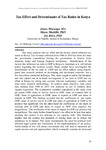| dc.description.abstract | The study analyzes the tax effort and the factors which influence tax ratios in Kenya. Tax revenue collected from 1980 to 2015 has been less than the government expenditure forcing the government to borrow from domestic banks and foreign financial institutions. Identification of the factors that influence tax ratio to GDP in Kenya is important as it will inform policy regarding the taxation system. Many studies have investigated the determinants of the tax ratio to GDP and tax effort indices using majorly panel data research method on developing and developed countries, but a few have been conducted in Kenya. This study sought to add to the literature and and carried out an in-depth investigation of tax ratio to GDP and tax effort in Kenya by taking into account relevant explanatory variables and time series research methodology. To achieve study objective, time series data running from 1980 to 2015 was analyzed by use of ordinary least squares regression. The explanatory variables considered in the study were per capita GDP, share of service sector in GDP, share of external debt in GDP, share of agriculture in GDP, share of exports in GDP and share of imports in GDP. The findings revealed that the coefficients of per capita GDP, share of service sector in GDP and share of agriculture in GDP to be positive but significant. On the other hand the coefficients of the share of external debt in GDP and share of export in GDP were negative but insignificant. The coefficient of the share of import in GDP was positive but insignificant. The study further found Kenya’s tax effort to be less than unity meaning the country is not utilizing its tax capacity fully. This therefore implies that the country has potential of raising more tax to reduce the imbalance in its budget. The study recommends the need for political will, efficient legal system and consistency in the implementation of tax policy. Achievement of this will attract investment that will lead to increased per capita income and job opportunities which eventually translate to increased taxes | en_US |

